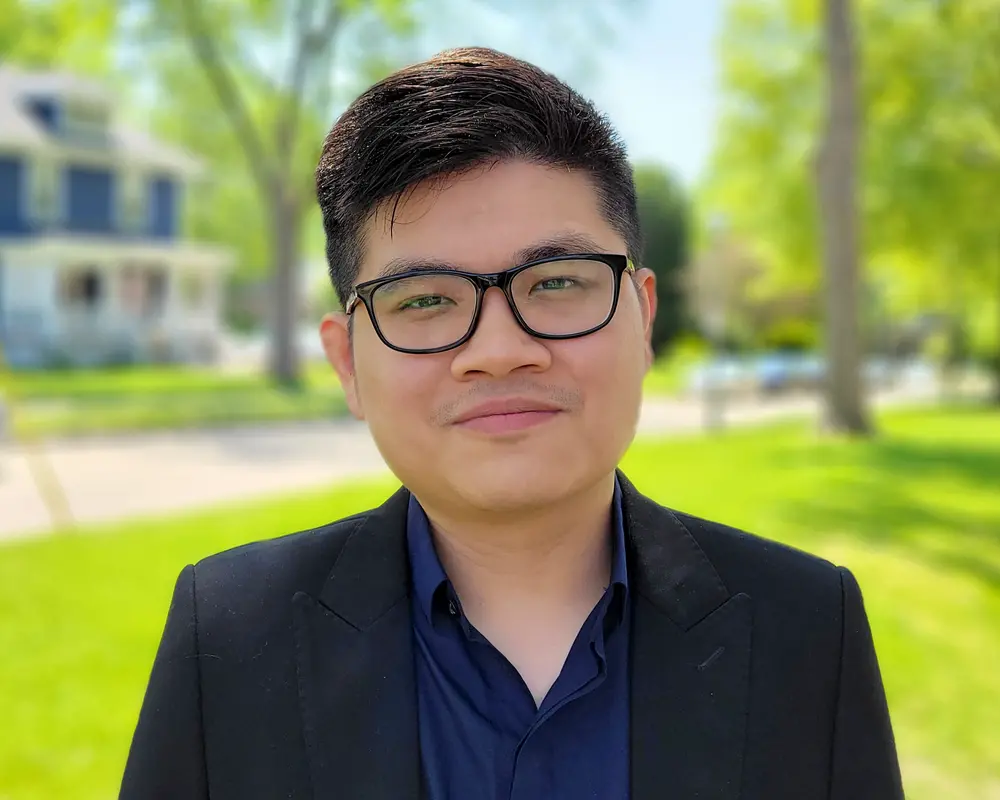
At the University of Tokyo, Dinh Thanh Nguyen participated in undergraduate research on the discovery of enzymes that enhance the cell membrane permeability of cyclic peptides.
That experience, Nguyen said, sparked his interest in enzyme discovery and led him to discover the work of Illinois chemistry professors Wilfred van der Donk and Doug Mitchell, who are leading experts in natural product biosynthesis. And in 2018 after graduating, he left Tokyo to begin graduate school in chemistry at Illinois where he wanted to be in both research groups.
“I really could not make the decision between Wilfred and Doug, and time has proven that they are both terrific mentors. When the deadline approached [to choose a group], they offered me a co-mentorship, which solved the problem. Being in two research groups broadened my horizons and gave me more opportunities to approach different research topics and interact with smart and enthusiastic colleagues,” Nguyen said.
Born and raised in Hanoi, Vietnam, Nguyen’s father was a chemical engineer and his mother a pharmacist, and it was conversations with his parents that he said ignited his interest in understanding matters and using chemistry to address societal problems.
“I was also fortunate to have very supportive chemistry teachers throughout my education. Their collective influence has inspired me to pursue chemistry to this day,” Nguyen said.
Now, with his final year of graduate school coming to a close after successfully defending his PhD thesis, Nguyen will be starting as a postdoctoral researcher in the lab of Professor Michael Laub in the Department of Biology at the Massachusetts Institute of Technology.
"I will be working on biochemical mechanisms of cellular integrity," Nguyen said.
During his graduate student career at Illinois, he worked in both the van der Donk and Mitchell labs to discover new enzyme functions and guide them toward developing therapeutic leads.
“Advances in genome sequencing indicate that we have only begun to understand natural diversity, as the functions of approximately over 200 million proteins remain unidentified—with more unknowns expected as genome sequencing continues,” said Nguyen, adding that enzymes are proteins that catalyze the formation of essential natural products and have been effectively used to synthesize new therapeutics. “Identifying new enzyme functions not only deepens our understanding of nature but also introduces innovative tools for drug discovery and development.”
A challenge, Nguyen said, in discovering new enzyme chemistry through mining genomic data is understanding their biological significance, specifically, why did the organisms evolve these enzymes, and what benefits do they gain from the resulting natural products? In his original research proposal, which resulted in the Vanderveer Voorhees award, Nguyen addresses this challenge.
“I developed a bioinformatic workflow to predict the biological importance of the uncharacterized enzymes and natural products encoded in the genome. The goal of this workflow is to prioritize experimental efforts toward enzymes that exhibit both novel chemical functions and biological activities,” he said.
Highlighting post-translational modifications as a route to new chemistry and useful enzymes has been a major highlight of his graduate school experience, Nguyen said. His work resulted in the discovery of biaryl macrocyclic peptides with biologically reactive C-terminal aminopyruvate, and enzymes that synthesize diverse libraries of pyridine-based macrocyclic peptides.
First, he said, the goal was understanding the benefits organisms gain from producing these natural products. Second, the goal was using the enzymes to engineer unique cyclic peptides into potential drug leads.
"Cyclic peptides are attractive therapeutic scaffolds with various molecules recently being approved by the FDA or reaching phase III clinical trials,” Nguyen explained.
He had many opportunities to present his research as a graduate student, including an ACS National Meeting, Gordon Research Conferences, including Bioorganic Chemistry and Sensory Transduction in Microorganisms, and an Enzyme Mechanism Conference, and a meeting at Howard Hughes Medical Institute.
Outside his graduate work, Nguyen said he enjoyed getting together with friends to play board games, which proved to be a great way to connect with friends, relax, and work his mind on something different than his research. He said he also enjoyed staying physically active, lifting and running at the gym, because it is crucial for maintaining good health and mental clarity.
Early in his graduate career, during the pandemic, Nguyen adopted a dog that he named Nala.
“Nala is truly a sweetheart,” he said. “Her delightful presence has greatly enriched my life. She loves long walks, playing with various toys, and being around people. Nala's strong motivation for food and intelligence make it easy to teach her tricks and maintain discipline.”